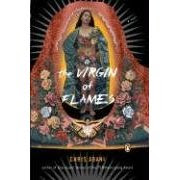 Just finished reading Chris Abani's new book, The Virgin of Flames. The book is by turns, gross, enlightening, deliciously tactile, strange and unbelievable. Abani immerses us in his vision of a post-Apocalyptic Los Angeles, complete with out of control brush fires burning California, a 50-foot tall illegal mural of a female Muslim freedom fighter crushing a dove, an implausible abandoned-lot, pseudo-porn male-on-male rape scene y más. The characters are a wildly, post-everything mix of racial, ethnic and gender identities.
Just finished reading Chris Abani's new book, The Virgin of Flames. The book is by turns, gross, enlightening, deliciously tactile, strange and unbelievable. Abani immerses us in his vision of a post-Apocalyptic Los Angeles, complete with out of control brush fires burning California, a 50-foot tall illegal mural of a female Muslim freedom fighter crushing a dove, an implausible abandoned-lot, pseudo-porn male-on-male rape scene y más. The characters are a wildly, post-everything mix of racial, ethnic and gender identities.I agree with Ruben Martinez' review in the LA Times that the book is at its best in its luxuriant asides about Los Angeles and the neglected river than runs through it. Like in his description of the old Mission at the center of L.A: as "no more than a glorified tourist attraction that attracted no tourists" and "sad, not in the way of a rejected wallflower, but more in the commonplace shame of a community center." And Iggy's lecture to the Black about being a native Angeleno, that since he did not come from somewhere else to L.A., "it is worse because you have nothing to fight against, nothing to let go of...That's why there's no visible native Angelenos...Ambivalence is the heart of this town."
The prose languors at times as the author seems bent on driving the plot forward to a predetermined end. And the unlikely plot twists (the rape or Ray-Rays death on wet) can seem contrived or forced. But beyond that, sentences like this save the book for me: "But there are no scriptures here in this city of angels where every moment is a life lived too fast, where the spines of freeways, like arteries, like blood, circle in hope. Permance is this River and with piety's conviction we make a home here."
There are a lot of similarities between the literature being written in L.A. now and what I wish I could find being written here in Houston. What I wish we could write one day. So for now, this new L.A. lit will nourish us. Abani, Nigerian transplant writing set in Latino East L.A. Next on the list: Atomik Aztex by Sesshu Foster. A barrio-raised, Chicano-identified Japanese American imagining an Aztek present.